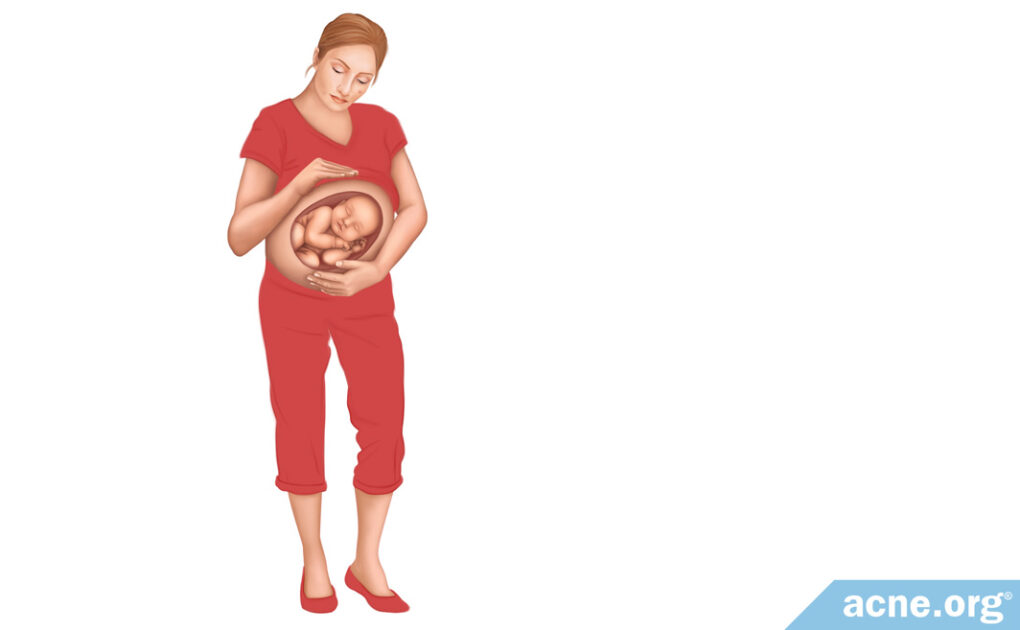Pregnancy Usually Helps Clear the Skin, But Sometimes It Can Worsen Acne, Especially During the Third Trimester

The Essential Info
Pregnancy increases estrogen levels, which can provide protection against acne. This is why we normally see acne symptoms decrease during pregnancy.
However, especially during the third trimester, pregnancy can also increase male hormone levels. This can have an opposite effect, and can sometimes trigger acne.
If acne does flare during pregnancy, the choice of treatment depends upon how severe the flare is. Important Note: Acne treatment during pregnancy should always be supervised by a doctor.

The Science
The hormonal changes that pregnancy causes in the body normally help provide a reprieve from acne. However, in some instances, women can experience a flare of acne, particularly in the third trimester.
Why does acne normally lessen during pregnancy? Levels of estrogens (female hormones that are present in both males and females) increase throughout pregnancy. In general, higher estrogen levels protect against acne.1,2
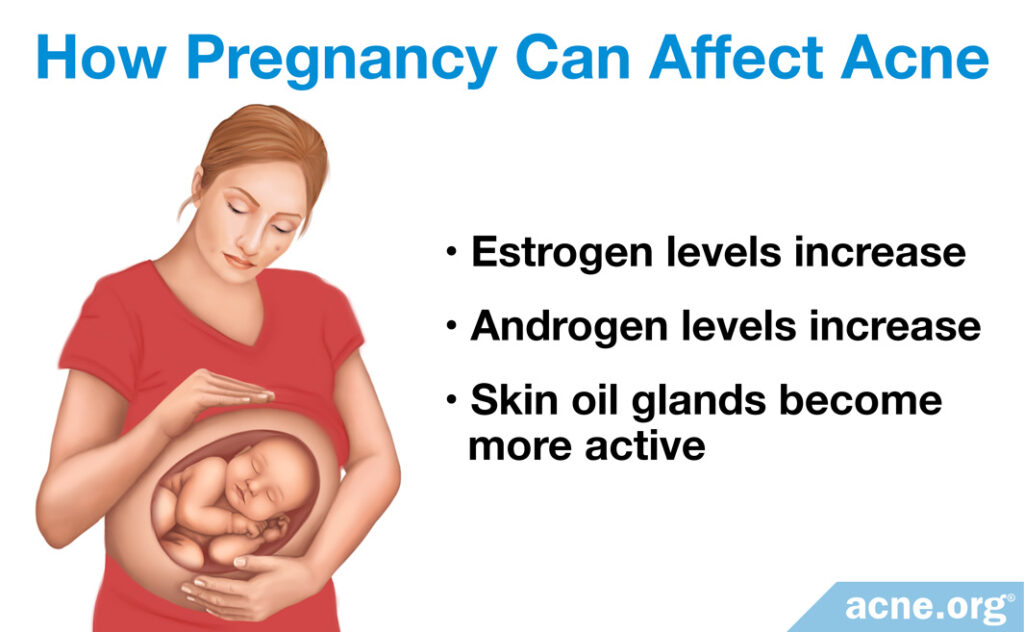
However, this is not always the case. Androgen (male hormones that are present in both males and females) levels can also sometimes increase during pregnancy, particularly during the third trimester. This can cause skin oil glands to become more active, resulting in the production of more skin oil, which may lead to a flare of acne. Because skin oil glands produce more oil during late stages of pregnancy, some women experience not only acne, but also greasy skin, especially on the face.1,3-5
In the following chart you can see how estrogen levels increase throughout pregnancy (see the red line). Increased estrogen levels may help protect against acne, and is likely why most women see their acne subside during all trimesters of pregnancy.
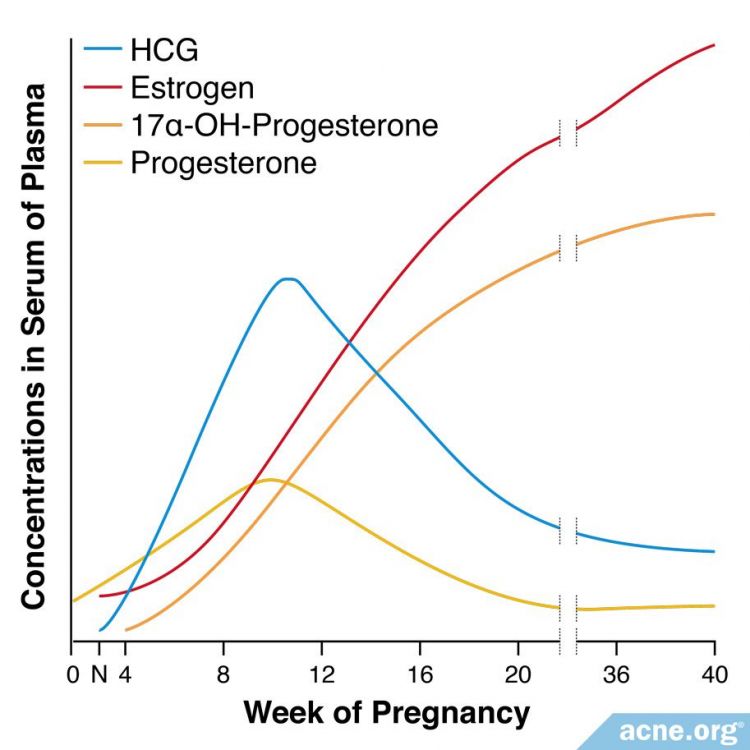
Studies Show Acne Normally Improves During Pregnancy
Most of the evidence in the scientific literature shows that acne improves during pregnancy. However, some studies show that it is possible for women to sometimes experience an increase in acne.6-11
Expand to read details of studies
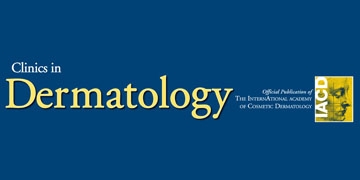
As a 2006 article in Clinics in Dermatology notes, “Acne may improve during pregnancy, but it is occasionally exacerbated during pregnancy.”6

A 1964 study published in the British Journal of Dermatology asked 415 women with acne to fill out a questionnaire. This study found that 57.5% of the women reported that their acne improved during pregnancy. For many of these women, improvement occurred early in the pregnancy. Only 5.4% of the women reported that their acne worsened during pregnancy.7

A 1994 study in the French journal Annales de Dermatologie et de Vénéréologie followed 60 pregnant women. In this study, 23% of the women had acne during their pregnancy. While we can’t draw any conclusions from this because the study did not mention how many of the women had acne prior to becoming pregnant, it gives us at least some data that approximately ¼ of the pregnant women studied had acne.8

Similarly, a study published in the Polish journal Ginekologia Polska in 2018 surveyed 1935 women who had given birth in the previous 4 years. Of these women, 21.6% reported that they had experienced acne during pregnancy.9
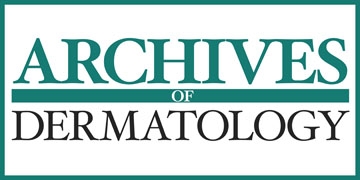
A 2001 study in Archives of Dermatology also investigated acne in adult women using a survey. The authors concluded, “Pregnancy affected acne in 65%…of the women, with 41%…reporting improvement and 29%…reporting worsening with pregnancy. Two patients each had improvement and exacerbation with 2 different pregnancies.”10 It is interesting to note that in this study, improvement or worsening of acne did not just differ between women, but that in two different cases, a single woman experienced improvement of acne during one pregnancy but worsening in another. This fact highlights the unpredictable ways in which pregnancy can affect acne.

A 2020 study published in the International Journal of Dermatology surveyed 295 pregnant women to investigate acne severity in different stages of pregnancy. More than half, or 56.6%, of the pregnant women had mild acne, 29.5% had moderate acne, 12.2% had severe acne, and only 1.7% had very severe acne. Mild-to-moderate acne was most common in the second trimester, while severe and very severe acne, if it did occur, typically happened in the third trimester. Therefore, the researchers wrote, “Severe acne during pregnancy is generally uncommon, while the severity of…[facial and body] acne…is higher in the third trimester than in other trimesters.”11
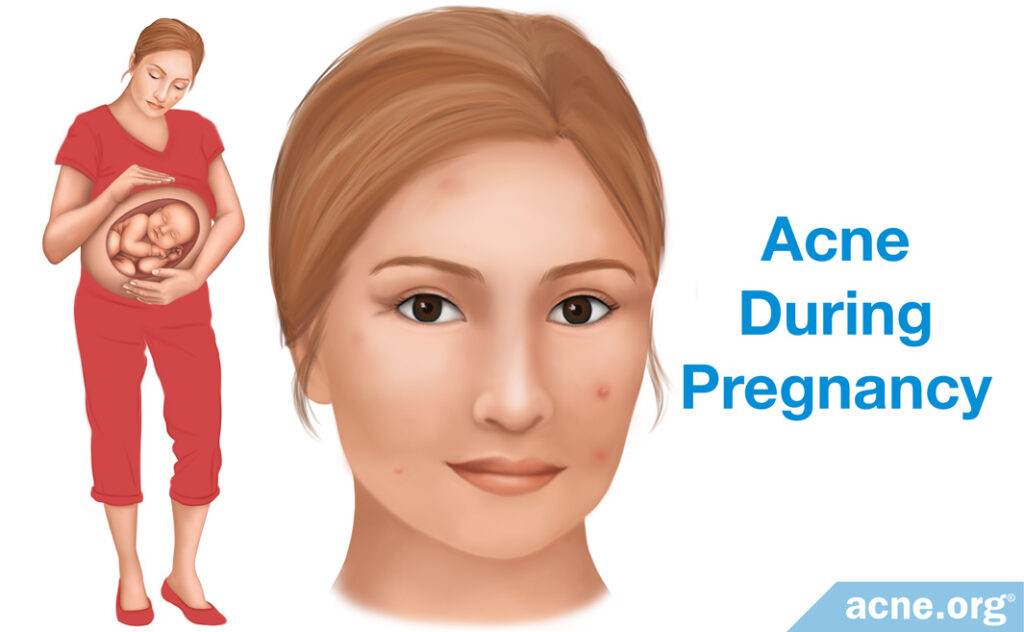
Treating Acne During Pregnancy
If acne does flare during pregnancy, treatment depends on the severity of the acne. It is very important for any pregnant woman to ask her doctor before embarking on a medicated regimen.
Topical treatments
For mild acne, a topical (applied to the skin) treatment may help. Topical treatments include:
- Benzoyl peroxide
- Topical antibiotics, such as clindamycin or erythromycin, along with benzoyl peroxide
- Azelaic acid
- Salicylic acid. It is important to note that salicylic acid should not be applied to large areas of skin because of the risk that it could be absorbed into the bloodstream.5
Oral antibiotics
For severe acne flares, oral antibiotics that are safe to use during pregnancy, such as erythromycin and penicillin, may provide relief. However, many common oral antibiotics are not safe during pregnancy, and even the oral antibiotics that are deemed safe can only be used for short periods of time and often do not provide adequate results. Oral antibiotics also have undesirable side effects such as diarrhea, and they contribute to antibiotic resistance, in which bacteria become resistant to antibiotics and the antibiotics lose their effectiveness against these bacteria.
Alternative Treatments
Alternative treatments that some physicians advise during pregnancy include light therapy and laser therapy. However, because these treatments employ UVB light, they can reduce the levels of folic acid in the body. Adequate amounts of folic acid are essential during pregnancy, and any woman undergoing UVB therapy during pregnancy should have her blood levels of folic acid tested and should take folic acid supplements if necessary. However, women should never take folic acid supplements without consulting their doctor, because too much folic acid is toxic.
Other alternative treatments, such as comedone extractors, which are tools that remove the material from clogged pores, and microdermabrasion (using a device to abrade away the outer layers of the skin), are safe to use during pregnancy. However, while both of these treatments might improve the appearance of skin in the short term, they do nothing to treat acne. They also both physically irritate the skin, which can bite back with breakouts in the weeks following.5
CAUTION!
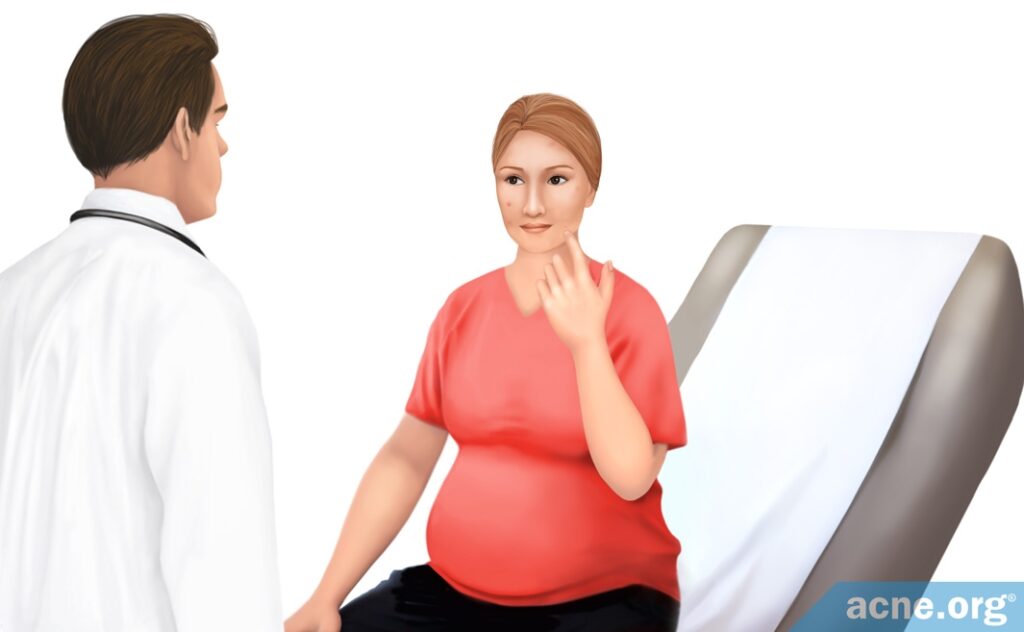
Oral retinoid medications, such as Isotretinoin (Accutane), cause severe birth defects and miscarriage and therefore should never be used during pregnancy or when trying to conceive.12 Doctors are also cautious about prescribing topical retinoids (tretinoin, adapalene, tazarotene) and other prescription medications during pregnancy. Be sure to speak with your doctor before using any medication while pregnant or planning to become pregnant.
References
- Elling, S.V. & Powell, F.C. Physiological changes in the skin during pregnancy. Clin. Dermatol. 15, 35-43 (1997). https://www.ncbi.nlm.nih.gov/pubmed/9034654
- Winton, G.B. & Lewis, C.W. Dermatoses of pregnancy. J. Am. Acad. Dermatol. 6, 977-998 (1982). https://www.ncbi.nlm.nih.gov/pubmed/7047596
- Jones, V., Ambros-Rudolph, C., & Nelson-Piercy, C. Skin diseases in pregnancy. BMJ. 348, Jun 3 (2014). https://pdfs.semanticscholar.org/f321/097e29cea815a416cfa7ba7719e41cd62718.pdf
- Tyler, K.H. Physiological skin changes during pregnancy. Clin. Obstet. Gynecol. 58, 119-124 (2015). https://www.ncbi.nlm.nih.gov/pubmed/25517755
- Yang, C.S., Teeple, M, Muglia. J., & Robison-Bostom, L. Inflammatory and glandular skin disease in pregnancy. Clin. Dermatol. 34, 335-343 (2016). https://www.ncbi.nlm.nih.gov/pubmed/27265071
- Oumeish, O.Y. & Al-Fouzan, A-W.S. Miscellaneous diseases affected by pregnancy. Clin. Dermatol. 24, 113-117 (2006). https://www.ncbi.nlm.nih.gov/pubmed/16487885
- Ratzer, M.A. The influence of marriage, pregnancy and childbirth on acne vulgaris. Br. J. Dermatol. 76, 165-168 (1964). https://www.ncbi.nlm.nih.gov/pubmed/14140740
- Estève, E., Saudeau, L., Pierre, F., Barruet, K., Vaillant, L.& Lorette, G. [Physiological cutaneous signs in normal pregnancy: a study of 60 pregnant women]. Ann. Dermatol. Venereol. 121, 227-231 (1994). https://www.ncbi.nlm.nih.gov/pubmed/7832550
- Ciechanowicz, P., Sikora, M., Taradaj, K., Ruta, A., Rakowska, A., Kociszewska-Najman, B., Wielgoś, M. & Rudnicka, L. Skin changes during pregnancy. Is that an important issue for pregnant women? Ginekol. Pol. 89, 449-452 (2018). https://www.ncbi.nlm.nih.gov/pubmed/30215465
- Shaw, J.C. & White, L.E. Persistent acne in adult women. Arch. Dermatol. 137, 1252- 1253 (2001). https://www.ncbi.nlm.nih.gov/pubmed/11559234
- Kutlu, Ö., Karadağ, A. S., Ünal, E., Kelekçi, K. H., Yalçınkaya İyidal, A., Topaloğlu Demir, F., Aksoy, B., Çölgeçen, E., Tosun, M., Emre, S., Tatlıparmak, A., Demirseren, D. D., Kaya Özden, H., Öztürk, M., Özlü, E. & Chen, W. Acne in pregnancy: A prospective multicenter, cross-sectional study of 295 patients in Turkey. Int. J. Dermatol. 59, 1098-1105 (2020). https://pubmed.ncbi.nlm.nih.gov/32562263/
- Tyler, K.H. Dermatologic therapy in pregnancy. Clin. Obstet. Gynecol. 58, 112-118 (2015). https://europepmc.org/abstract/med/25517754
 Acne.org Products
Acne.org Products